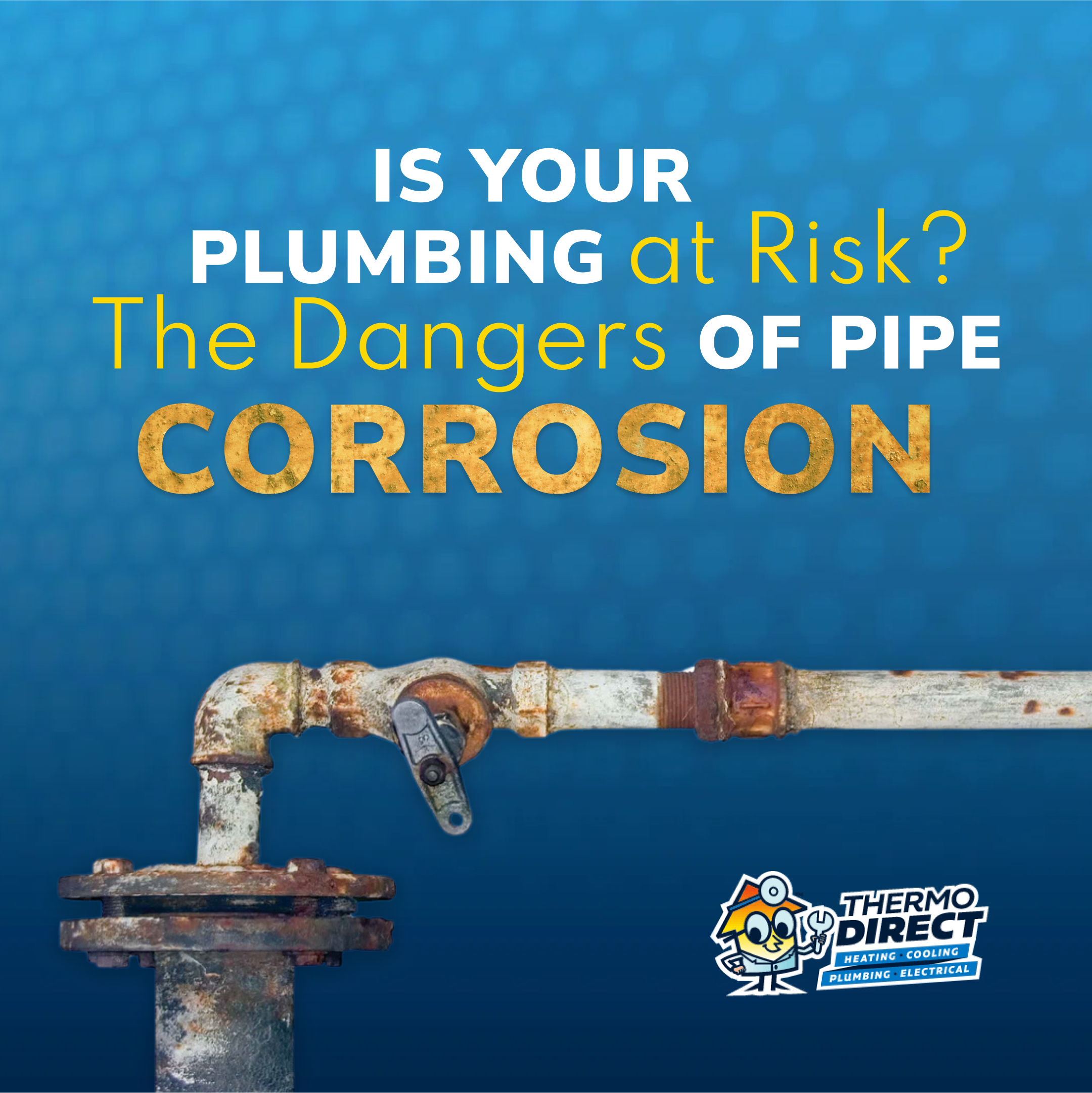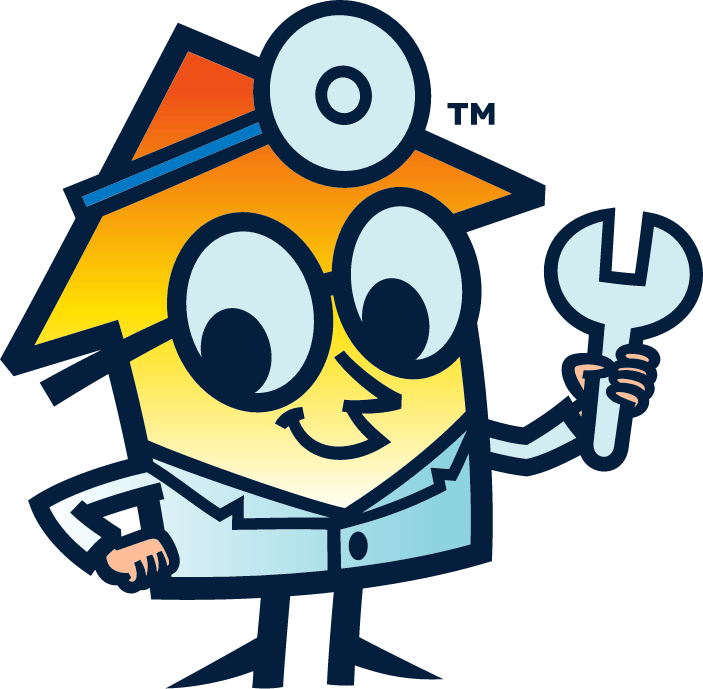Pipe corrosion isn’t always obvious, but it can pose serious consequences for your plumbing system and your household’s health. Understanding the causes and signs of pipe corrosion helps strategize preventative action — learn more about pipe corrosion, its link to burst pipes, and when to get support from our plumbing team at Thermo Direct.
What is Pipe Corrosion?
Pipe corrosion refers to the deterioration of a pipe’s structure and metal interior, which weakens its structural integrity and increases susceptibility to leaks and bursts. Specifically, corrosion is a byproduct of a natural electrochemical process where a refined metal gradually degrades from exposure to water, oxygen, and other environmental elements. When the metal pipe comes into contact with these elements, it oxidizes and undergoes an electrochemical structure change.
Corrosion may affect pipe materials in different ways. For example, pitting corrosion creates a deep cavity localized to a small point, uniform corrosion spreads evenly across the metal’s surface. Both compromise the integrity and strength of your pipes.
Metal, including copper and steel, is most prone to corrosion. Your plumbing system may still be subject to corrosion if it relies on other materials such as polyvinyl chloride or acrylonitrile butadiene styrene. Based on its properties and variable environmental conditions, each plumbing material carries its own susceptibility to corrosion.
Common Causes of Pipe Corrosion
Pipe corrosion occurs in various materials and can result in significant damage to your plumbing system. Common causes of pipe corrosion include:
- Acidic water: Water with a low pH contains excessive acid that breaks down pipes from the inside out.
- Oxygenated water: Dissolved oxygen in water accelerates oxidation and rusting in metal pipes.
- Hard water: High mineral content, especially calcium and magnesium, contributes to mineral buildup and corrosion.
- Metals in water: Metals in water draw electrons from pipe metals in a process called galvanic corrosion, accelerating deterioration.
- Electricity: Ungrounded electrical currents traveling through pipes can cause localized corrosion.
- High velocity: High water pressure and fast-traveling water may corrode pipes.
- Hot water: Temperatures exceeding 180 degrees can accelerate corrosion.
Signs and Symptoms of Pipe Corrosion
Numerous plumbing system symptoms may signal pipe corrosion and other underlying issues. These include:
- Low water pressure: Water pressure drops may indicate a blockage or leak stemming from corrosion.
- High water bills: Inexplicably higher bills or water meter readings may point to hidden leaks in corroded pipes.
- Cloudy or discolored water: Corrosion may leak into and stain your water, making it appear cloudy or discolored.
- Strange water tastes or smells: Water containing corrosion usually has a distinctively metallic taste.
- Strange noises: Gurgling, banging, or other sounds in your pipes suggests air trapped from leaks or blockages.
- Water stains: Corroded and leaky pipes may eventually stain your walls and ceilings or cause structural damage.
The Link Between Corrosion and Burst Pipes
Corrosion is a common cause of burst pipes. As corrosion weakens the structural integrity of your pipes, they become more likely to fail under pressure. Small leaks and cracks gradually worsen and may cause the pipe to burst, leading to significant damage to your home.
Inspect your visible pipes for rust, pitting, and other signs of corrosion, and check around them for leaks or moisture. Consider the age and type of material — since corrosion is inevitable, older systems are more susceptible to higher corrosion levels, particularly if they’re made from a vulnerable material that’s more likely to corrode than others.
Dangers of Corrosion and Burst Pipes
Corroded pipes can pose critical danger to your home and family. Water damage from burst pipes can cause severe damage to walls, floors, ceilings, appliances, and belongings, sometimes even threatening the structural integrity of your home. Prolonged moisture from pipe leaks or bursts may also encourage mold growth, which spreads spores and causes respiratory irritation.
While corrosion alone isn’t a health hazard, its dissolving effects lead to other water quality and health risks. For instance, rusty water encourages bacterial growth, such as Legionella, which can cause pneumonia and other illnesses. Consuming water with metal particles can cause stomach and intestinal distress. Iron oxide in rusty water can cause allergic contact dermatitis and inflamed, itchy, rough, and discolored skin.
Homes built before 1991 may have lead pipes or solder, which can release particles in the water supply. Lead is associated with adverse health effects, and accumulation in the body can cause neurological damage, cardiovascular problems, kidney damage, and reproductive struggles. Lead has no taste, smell, or color when it’s dissolved in water and requires a chemical test to detect. Some areas have regulations to minimize lead exposure and may impose mandated lead pipe replacement.
Preventing Pipe Corrosion and Burst Pipes
Preventative action helps maintain a healthy plumbing system and avoid the disruption, damages, costs, and health concerns of burst pipes. Try these strategies for preventing pipe corrosion and burst pipes:
- Schedule professional plumbing inspections.
- Have a plumber test your water pH and quality.
- Use a water softener or other treatment to minimize corrosive elements.
- Set your water pressure to about 55 PSI and temperature to 120 degrees.
- Opt for corrosion-resistant materials for new installations or replacements.
- Monitor for leaks, discolored water, pressure drops, and other signs to catch plumbing problems before they escalate.
Schedule Plumbing Inspection and Repair With Thermo Direct
Serving Raleigh, North Carolina, since 2000, Thermo Direct delivers plumbing services. Emphasizing high-quality workmanship and reliability in every service, our team strives to keep your plumbing system healthy and in good working order. Take advantage of flexible financing, expert plumbing support, and other benefits when you choose Thermo Direct — contact us or schedule online for pipe corrosion concerns and other services.
Frequently Asked Questions
How often should I have my plumbing inspected for corrosion?
Plan for annual plumbing inspections to minimize corrosion, especially if your home is more than 25 years old.
How long do plumbing pipes last?
Plumbing pipe lifespans vary depending on the material. Cast iron pipes have the longest potential lifespan, lasting between 50 and 100 years. In contrast, PVC pipes usually last between 25 and 40 years.
What should I do if a pipe bursts in my home?
Shut off the water supply at the main water valve, and turn off electricity at the circuit or main breaker if it’s safe to do so. Contact a plumber to find and repair the underlying cause.









